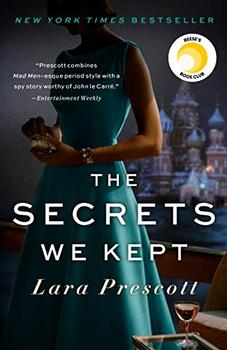Summary | Excerpt | Reading Guide | Reviews | Beyond the Book | Readalikes | Genres & Themes | Author Bio

A novel
by Lara Prescott
Winter didn't offer much reprieve. We'd bundle up and rush from our bus stop with our head down to avoid the winds that blew off the icy Potomac.
But in the fall, the city came alive. The trees along Connecticut Avenue looked like falling orange and red fireworks. And the temperature was lovely, no need to worry about our blouses being soaked through at the armpits. The hot dog vendors would serve fire-roasted chestnuts in small paper bags—the perfect amount for an evening walk home.
And each spring brought cherry blossoms and busloads of tourists who would walk the monuments and, not heeding the many signs, pluck the pink-and-white flowers and tuck them behind an ear or into a suit pocket.
Fall and spring in the District were times to linger, and in those moments we'd stop and sit on a bench or take a detour around the Reflecting Pool. Sure, inside the Agency's E Street complex the fluorescent lights cast everything in a harsh glow, exaggerating the shine on our forehead and the pores on our nose. But when we'd leave for the day and the cool air would hit our bare arms, when we'd choose to take the long walk home through the Mall, it was in those moments that the city on a swamp became a postcard.
But we also remember the sore fingers and the aching wrists and the endless memos and reports and dictations. We typed so much, some of us even dreamed of typing. Even years later, men we shared our beds with would remark that our fingers would sometimes twitch in our sleep. We remember looking at the clock every five minutes on Friday afternoons. We remember the paper cuts, the scratchy toilet paper, the way the lobby's hardwood floors smelled of Murphy Oil Soap on Monday mornings and how our heels would skid across them for days after they were waxed.
We remember the one strip of windows lining the far end of SR—how they were too high to see out of, how all we could see anyway was the gray State Department building across the street, which looked exactly like our gray building. We'd speculate about their typing pool. What did they look like? What were their lives like? Did they ever look out their windows at our gray building and wonder about us?
At the time, those days felt so long and specific; but thinking back, they all blend. We can't tell you whether the Christmas party when Walter Anderson spilled red wine all over the front of his shirt and passed out at reception with a note pinned to his lapel that read do not resuscitate happened in '51 or '55. Nor do we remember if Holly Falcon was fired because she let a visiting officer take nude photos of her in the second-floor conference room, or if she was promoted because of those very photos and fired shortly after for some other reason.
But there are other things we do remember.
If you were to come to Headquarters and see a woman in a smart green tweed suit following a man into his office or a woman wearing red heels and a matching angora sweater at reception, you might've assumed these women were typists or secretaries; and you would've been right. But you would have also been wrong. Secretary: a person entrusted with a secret. From the Latin secretus, secretum. We all typed, but some of us did more. We spoke no word of the work we did after we covered our typewriters each day. Unlike some of the men, we could keep our secrets.
Excerpted from The Secrets We Kept by Lara Prescott. Copyright © 2019 by Lara Prescott. All rights reserved. No part of this excerpt may be reproduced or reprinted without permission in writing from the publisher.
A classic is a book that has never finished saying what it has to say
Click Here to find out who said this, as well as discovering other famous literary quotes!
Your guide toexceptional books
BookBrowse seeks out and recommends the best in contemporary fiction and nonfiction—books that not only engage and entertain but also deepen our understanding of ourselves and the world around us.